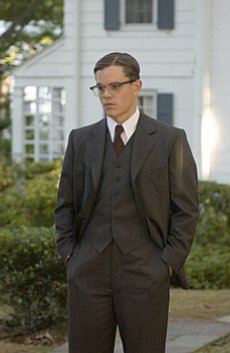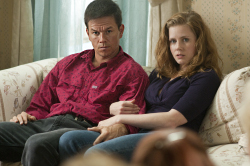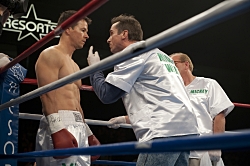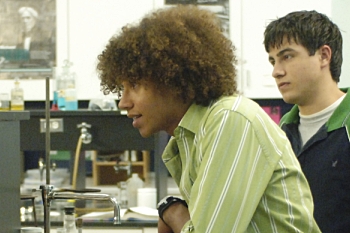Interview With Milt Bearden (CIA Consultant)
 Interview With Matt Damon (Edward Wilson)
Interview With Matt Damon (Edward Wilson)
 Interview With Robert De Niro (Bill Sullivan, Director, Producer)
Interview With Robert De Niro (Bill Sullivan, Director, Producer)
 Interview With Angelina Jolie (Clover Russell)
Interview With Angelina Jolie (Clover Russell)
 Interview With Eric Roth (Screenwriter)
Interview With Eric Roth (Screenwriter)
 Interview With John Turturro (Ray Brocco)
Interview With John Turturro (Ray Brocco)
Popular on LondonNet
 One of Hollywood’s most popular actors among his peers, Damon’s career was launched by the unruly genius Will Hunting, the eponymous hero of a film that earned Damon a nomination as an actor and saw him and Ben Affleck scoop the 1996 Oscar® for Best Original Screenplay. Damon’s trajectory has continued to soar. He was excellent as a fidgety, emaciated solider in Ed Zwick’s Courage Under Fire, starred in Steven Spielberg’s Saving Private Ryan and, in 1999, conjured a memorable performance as the creepy killer Tom Ripley. He has established himself among the Hollywood A-list with his pair of Ocean’s and Bourne films, and has made a series of fine personal choices, from Stephen Gaghan’s Syriana, Scorsese’s The Departed and now this month’s The Good Shepherd, each film benefiting from Damon’s ability to project both a warm affability and a withdrawn sourness.
One of Hollywood’s most popular actors among his peers, Damon’s career was launched by the unruly genius Will Hunting, the eponymous hero of a film that earned Damon a nomination as an actor and saw him and Ben Affleck scoop the 1996 Oscar® for Best Original Screenplay. Damon’s trajectory has continued to soar. He was excellent as a fidgety, emaciated solider in Ed Zwick’s Courage Under Fire, starred in Steven Spielberg’s Saving Private Ryan and, in 1999, conjured a memorable performance as the creepy killer Tom Ripley. He has established himself among the Hollywood A-list with his pair of Ocean’s and Bourne films, and has made a series of fine personal choices, from Stephen Gaghan’s Syriana, Scorsese’s The Departed and now this month’s The Good Shepherd, each film benefiting from Damon’s ability to project both a warm affability and a withdrawn sourness.
It’s back to the beginning for you — without the CIA there’d be no Jason Bourne.
That’s true – it’s been an agency that’s provided me with great career opportunities!
The film suggests that the film was born from this elitist society.
Well it was. The people who were there at the beginning did come out of this set, Skull & Bones, and this is all based on fact. It’s a very well documented time and there have been countless biographies written about the men who were there at the beginning. There’s a lot of information available so we wanted to be accurate in terms of representing how things actually were.
Your character’s a composite based mainly on James Angleton, right?
Yeah, we didn’t want to come out and have it be Angleton because then you’re making a biopic which is something entirely different and wasn’t what we wanted to do. He was partly a model for the character though.
Looking at some of your recent roles, if they’re looking for a serious SOB with no sense of humor, do they always come to you?
Well hopefully not in real life. Hopefully I am a little more fun that Edward. But in terms of this role, that’s what was required. And that was the great thing for me – doing this with De Niro. All through shooting he was sitting as close to me as you are now, just off camera, watching every detail of the performance and helping me, urging me to go one way or another in a scene. He was very hands-on, and a very particular, detail-orientated director. So that was great for me.
 Was it unusual for you to be as understated and unemotional as your character?
Was it unusual for you to be as understated and unemotional as your character?
It is unusual to be given permission to do that. Most films and directors lose their nerve and want to indicate a bit more, to show that their story is clear. I’m not saying that’s a good thing; as an actor its anathema to good acting, but to have someone with the confidence to say that should I be utterly natural and minimalist was great, because that’s what these characters are. To broadcast their feelings is putting them in danger, potentially, so they would mask their emotions.
Did you find yourself taking on De Niro-isms?
No, he’s so unique, you’d be accused of imitating him!
As a new father, are you more aware of the sacrifices these guys make in terms of their family?
Most definitely, and the price that the job exacts. We did lots of research and met some family members of some of the original guys in the CIA and it’s a shared sacrifice. The family sacrificed too. The agents are very busy, don’t come back much, and that’s a burden borne by the family as well.
Now there’s a stigma attached to the CIA. Do you think that’s warranted?
Well, it’s confusing, because it’s always changing. The rules have changed in the last few years, too. I think it’s something that the citizenry needs to be vigilant about – participating in democracy, and that includes issues like what’s going on now, and how much secrecy and transparency there should be. That’s an on-going thing – in a democracy you want checks and balances and oversight, but you need a covert agency to protect the country. It’s a very tricky balance and I think it changes as the world changes and I think we all need to be mindful of that.
The world changed with 9/11. Do you think the agency has a G-d complex?
I think it did at this time. Obviously, going into the Bay of Pigs, these guys must have thought they were invincible. They’d come up through OSS, they’d won the Second World War, had great success in Iran in ’53 and Guatemala in ’54. They must have felt on top of the world. Now, I think they’ve taken some hits since then and maybe the G-d complex isn’t what it was here, like in the scene where Richard Hayes says ‘Why don’t you put a ‘The’ in front of the CIA? Because you don’t put ‘The’ in front of G-d.” I think that probably is a true representation of time, although not of the situation now.
In the film, people like your character were held as idealists and true patriots. When did idealism get such a bad name?
Well it’s a fine line. People do things in the names of good, and in the name of ideals, but the world isn’t that simple. So they end up doing things that aren’t necessarily good. Even if they think they’re doing the right thing, but when viewed from a different perspective they can look barbaric and crazy. I think in terms of playing the role, my job was to understand why he did everything that he did. And that was no problem – the script was well constructed, and even though he does some unseemly things there’s a reason why he does them. And there’s a rationale to why he’s doing them.
You’ve know Angelina for a few years and you’ve become closer more recently. Did that help at all?
It was interesting because she’s so unlike the character that she plays. I can’t imagine Angelina suffering in a relationship where she’s not happy. She’s very independent and very strong and yet she plays a woman very much of that time, who would live that quiet life of silent suffering for the sake of her son. I was joking with her that whatever her instinct was she’d do the opposite thing, and that’s how she’d find the character. But it’s a testament to her skill as an actor that she’s so good at playing someone who’s so different from her.







